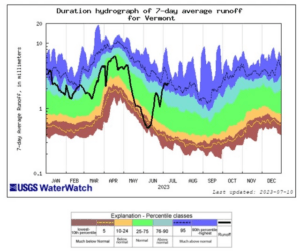
Gordon’s Policy Corner, July 2023: This year has already sent a clear message to the world that our changing climate is no longer a future concern, but a current hazard. At OFRF, our staff is spread out across this nation. During our virtual staff meetings I hear personal reports from our staff dealing with historic tornadoes, hail, and smoke in the midwest; swinging from a millennia-era drought to unprecedented flooding in the West; sweating through a heat dome and drought in the Southeast; breathing smoke-filled air from wildfires raging through Canada. This spring we experienced unheard-of late frosts where I live in New England, and as I write this we’ve shifted from historic short-term drought a month ago to historic flooding this week, with road closures and evacuations occurring across Vermont.
We are living in the anthropocene era of Earth’s history. We know that organic agriculture has the potential to significantly mitigate and adapt to the effects of climate change, yet we continue to see a lack of any urgency for action to answer these problems in Washington DC.
This Farm Bill has been continually framed as a “flat farm bill,” meaning that there will be no increases to the baseline budget of programs. This means that for any program to see an increase in funding, another program must be cut. That is why we are championing bills in Congress like the Strengthening Organic Agriculture Research Act in the House, and the Organic Science and Research Investment Act in the Senate, being introduced this week. These are not the only actions we are taking, though, and are actively working with coalitions to make it clear to the Senate and House Committees on Agriculture that this is not the time to reduce research funding.
Agricultural research programs don’t just answer producer’s questions or support early-career scientists (although they do both of those things). They also significantly benefit the rural communities that actively participate in and host these crucial research projects. Every dollar invested in public agricultural research generates an impressive $20 of benefits. Despite this well-documented impact, public funding for agricultural research has experienced a 20% decline since the turn of the century, while funding for other research areas has increased during the same period.
Gathering signatures for organizational letters is a crucial part of Farm Bill strategy, but what carries real impact is the ability to make this a human story. We need your input on the challenges being faced, and the research products that are helping you overcome them and thrive. For us to communicate with the powers-at-be in our nation’s capital, we need to hear what you are experiencing, and how continued and expanded investments into research and conservation are needed to answer these challenges. Please use this quick form to share your story, and we will follow up with you to make sure it is brought to the right ears.
Eat Well,
Gordon
. . .
Featured image by Ted Eytan – https://www.flickr.com/photos/taedc/50258343683/, CC BY-SA 2.0, https://commons.wikimedia.org/w/index.php?curid=93703987


